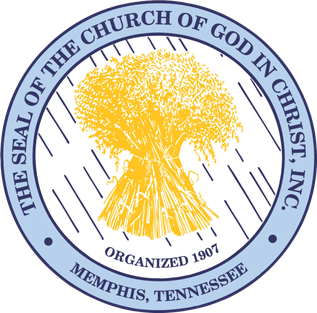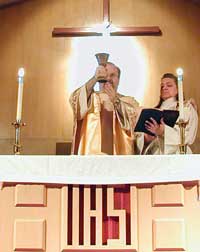Related Research Articles
A bishop is an ordained member of the clergy who is entrusted with a position of authority and oversight in a religious institution. In Christianity, bishops are normally responsible for the governance and administration of dioceses. The role or office of the bishop is called episcopacy. Organizationally, several Christian denominations utilize ecclesiastical structures that call for the position of bishops, while other denominations have dispensed with this office, seeing it as a symbol of power. Bishops have also exercised political authority within their dioceses.

An episcopal polity is a hierarchical form of church governance in which the chief local authorities are called bishops. The word "bishop" here is derived via the British Latin and Vulgar Latin term *ebiscopus/*biscopus, from the Ancient Greek ἐπίσκοπος epískopos meaning "overseer". It is the structure used by many of the major Christian Churches and denominations, such as the Catholic, Eastern Orthodox, Oriental Orthodox, Church of the East, Anabaptist, Lutheran, and Anglican churches or denominations, and other churches founded independently from these lineages. Many Methodist denominations have a form of episcopal polity known as connexionalism.
The United Methodist Church (UMC) is a worldwide mainline Protestant denomination based in the United States, and a major part of Methodism. In the 19th century, its main predecessor, the Methodist Episcopal Church, was a leader in evangelicalism. The present denomination was founded in 1968 in Dallas, Texas, by union of the Methodist Church and the Evangelical United Brethren Church. The UMC traces its roots back to the revival movement of John and Charles Wesley in England, as well as the Great Awakening in the United States. As such, the church's theological orientation is decidedly Wesleyan. It embraces liturgical worship, holiness, and evangelical elements.

An episcopal see is, in a practical use of the phrase, the area of a bishop's ecclesiastical jurisdiction.

The Church of God in Christ (COGIC) is an international Holiness–Pentecostal Christian denomination, and the largest Pentecostal denomination in the United States. Although an international and multi-ethnic religious organization, it has a predominantly African American membership based within the United States. The international headquarters is in Memphis, Tennessee. The current Presiding Bishop is Bishop John Drew Sheard Sr., who is the Senior Pastor of the Greater Emmanuel Institutional Church of God in Christ of Detroit, Michigan. He was elected as the denomination's leader on March 27, 2021.
A bishop is a senior role in many Methodist denominations. The bishop's role is typically called the "episcopacy", based on the Greek word episkopos (επισκοπος), which literally means overseer. Superintendent is another translation of episkopos but in most Methodist denominations this is a role distinct from bishop. The first Methodist bishops were appointed in America, and many Methodist denominations, such as the Free Methodist Church, recognize the office of bishop. Others, such as the Fellowship of Independent Methodist Churches, do not have bishops.
Hae Jong Kim was a Korean-American bishop of the United Methodist Church, elected in 1992, who resigned as a bishop in 2005.
David Jerald Lawson was an American who gained notability as a pastor and university campus minister in the Methodist and United Methodist churches, as a district superintendent, annual conference official, and as a bishop of the United Methodist Church (UMC), elected in 1984. He also played a key role establishing and developing Africa University, which is the only UMC university on the continent.
Robert Tsugio Hoshibata is a bishop of The United Methodist Church (UMC), the second-largest Protestant denomination in the United States. He was elected to the episcopacy in 2004. His first assignment was as Bishop of the Oregon-Idaho Conference of the UMC. He currently serves as Bishop of the Phoenix Episcopal Area, Desert Southwest Conference for the UMC.
Robert Eric Hayes Jr. is a member and serves as Bishop Emeritus of the Global Methodist Church. At its May 22, 2023, weekly meeting, The Global Methodist Church's Transitional Leadership Council (TLC) received the Rev. Dr. Robert Hayes Jr. as a clergy member in the new denomination and then immediately voted to confer upon him the title bishop emeritus. Hayes joins Bishop Emeritus Mike Lowry as the only other bishop granted that status.
An annual conference is a regional decision-making body within various Methodist denominations. Conferences are a key characteristic of the connexional (connectional) system of government in Methodism. Annual conferences are composed primarily of the clergy members and a lay member or members from each charge. Each conference is a geographical division. In general, the smaller states in the United States hold one conference each, while larger states often include two or more conferences. Several annual conferences are held in other nations as well.
Robert Hitchcock Spain was an American bishop of the United Methodist Church who was elected in 1988.

An elder, in many Methodist churches, is an ordained minister that has the responsibilities to preach and teach, preside at the celebration of the sacraments, administer the church through pastoral guidance, and lead the congregations under their care in service ministry to the world.
Bruce Robert Ough is a United Methodist Church bishop, elected in 2000.
Ralph Kern Eutsler was an American bishop of the United Methodist Church, elected in 1984.
An episcopal area in the United Methodist Church (UMC) is a basic unit of this denomination. It is a region presided over by a resident bishop that is similar to a diocese in other Christian denominations. Each annual conference in the UMC is within a single episcopal area; some episcopal areas include more than one annual conference. Episcopal areas are found in the United States as well as internationally. In some cases, such as the Western Jurisdiction of the US as well as some places internationally, an episcopal area covers a very large territory.
Joel Neftali Martinez is a Mexican-American bishop of the United Methodist Church, elected in 1992. Prior to his election to the episcopacy, Rev. Martinez gained notability as a Pastor and District Superintendent in the Methodist and United Methodist Churches and as a denominational official in the area of ethnic ministries.
The Texas Annual Conference of the United Methodist Church is the regional body of congregations and ministries in East Texas, from Texarkana west to approximately Cedar Creek Lake in the north, Thorndale in the west, and Bay City in the southwest and down to the Gulf Coast and back east to the Louisiana border. It is headquartered in Houston, Texas with Bishop Cynthia Fierro Harvey currently serving as the presiding Bishop. The Texas Annual Conference is also unofficially referred to as "the Houston Area of The United Methodist Church". The Texas Annual Conference is the largest Annual Conference in the Church's South Central Jurisdiction and the third largest in the United Methodist denomination.
The Jurisdictional Conferences are a collection of Annual Conferences of The United Methodist Church located inside the United States.
Sally Dyck is an American minister who is a bishop in the United Methodist Church, the second largest Protestant denomination in the United States. In 2021, she will begin serving as the Ecumenical Officer of the Council of Bishops of the United Methodist Church.
References
- ↑ Jason DeRose (2024-04-26). "United Methodist Church begins reorganization over LGBTQ+ issues". NPR. Retrieved 2024-05-01.